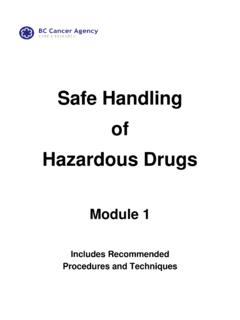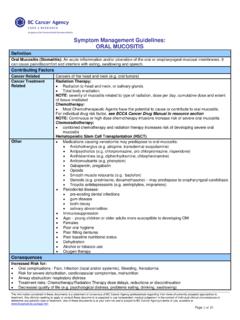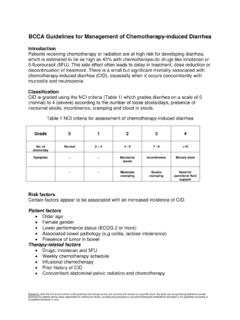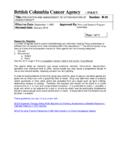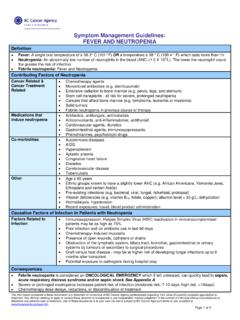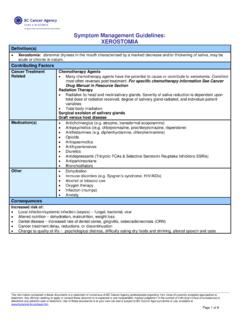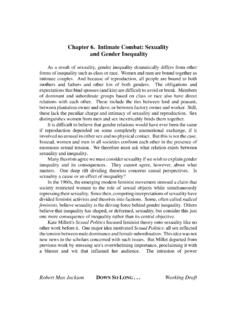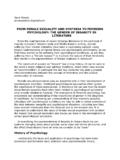Transcription of Symptom Management Guidelines: INTIMACY AND SEXUALITY
1 Symptom Management guidelines : INTIMACY AND SEXUALITY . Definition(s). SEXUALITY : Encompasses sexual behaviors, gender identities and roles, sexual orientation, eroticism, pleasure, INTIMACY , and reproduction. Is a complex phenomenon which encompasses our biological being, sense of self, and the way in which we relate to others. INTIMACY : Sharing of identity, mutual acceptance, closeness and reciprocated rapport more closely linked to communication than sexual function. INTIMACY , like SEXUALITY , is intrinsic to a sense of self. Contributing Factors Cancer Treatment Surgery Related - Depending on surgical site, may result in infertility, altered sexual function and/or alterations in body image ( prostate surgery, testicular surgery, hysterectomy, oopherectomy, vaginectomy, vulvectomy, abdomnioperineal resection, mastectomy). Chemotherapy - Can cause temporary or permanent loss of ovarian and testicular function resulting in infertility for both, and premature menopausal symptoms for women - Sensory neuropathy in the genitals Radiation therapy - Radiation to the pelvic area can cause vascular or nerve damage which impairs sexual functioning either temporarily or permanently - Women: Vaginal atrophy, stenosis, fibrosis, or shortening, amenorrhea, painful intercourse, decreased lubrication, ovarian failure, premature menopause, diminished libido - Men.
2 Decreased testosterone secretion, testicular aplasia, diminished semen volume, ejaculatory pain, diminished libido Hormonal Agents - May result in weight loss or gain, menopausal symptoms, diminished libido, erectile dysfunction, masculinization in women, emasculation in men Immunotherapy Checkpoint Inhibitors - Diminished libido, mood changes, weight gain or loss or fatigue due to immune mediated side effects. Biologic Agents - Mucous membrane dryness, diminished libido, erectile dysfunction, pelvic pain Symptoms Physical symptoms can alter comfort, interest, desire, and ability to engage in sexual activities ( fatigue, pain, dyspnea, nausea). Psychological distress ( anxiety, depression, fear, uncertainty)-can decrease one's energy, ability to concentrate and relax Changes in bowel or bladder functioning ostomy Changes in mobility and Range of motion- may inhibit ability to comfortably engage in sexual positions Side Effects of Many medications used for Symptom Management ( some anti-emetics, opioids, Medications anxiolytics, antidepressants, antihypertensives, antihistamines) have sedative effects, sense dulling properties, reduce libido and/or interfere with erectile function Vaginal dryness and other menopausal symptoms Body Image Related to weight changes, hair loss, surgical scarring, changes in elimination patterns ( Disturbance ostomies, catheters).
3 Partner Concerns Emotional distress, fears about hurting patient Role shifting/confusion- INTIMACY can be difficult when partner has various roles- caregiver, partner, lover. Consequences Altered perceptions of body image, self-esteem, self-confidence Psychological distress, feelings of isolation and/or alienation Changes in relationships Aversion or reluctance to engage in activities of sexual/intimate expression The information contained in these documents is a statement of consensus of BC Cancer Agency professionals regarding their views of currently accepted approaches to treatment. Any clinician seeking to apply or consult these documents is expected to use independent medical judgement in the context of individual clinical circumstances to determine any patient's care or treatment. Use of these documents is at your own risk and is subject to BC Cancer Agency's terms of use, available at Page 1 of 6.
4 Focused Health Assessment Modify assessment to accommodate variations in patient age, gender , culture, sexual orientation and stage of illness Include patient's partner, as appropriate GENERAL Symptom ASSESSMENT PHYSICAL ASSESSMENT. ASSESSMENT. Contact and Normal General General Do you feel that your diagnosis has led to changes or Note mood, affect;. Information difficulties in your sexual feelings or expression? (if so, in cognitive status; general Physician name - what way(s)?) physical status oncologist, family How do you express your SEXUALITY (before your diagnosis? physician Now?) Hydration Status Pharmacy Mucous membranes . Home health care Onset moist, dry? Other healthcare When did the change(s) occur? Skin turgor, capillary refill providers Allergies Provoking / Palliating Skin Integrity What do you believe is causing your difficulties?
5 Presence of wounds, Consider What makes it better? Worse? surgical scars, degree of Contributing healing Factors Quality Presence of alopecia Cancer diagnosis Can you describe your concerns regarding SEXUALITY and and treatment(s) INTIMACY ? Abdominal Assessment note type & date Abdominal distention, of last treatment Severity Abdominal and pelvic pain Medical history How bothersome are your concerns? and tenderness Medication profile Recent lab or Treatment Range of Motion diagnostic reports Have you tried to do anything to address your concerns With or without discomfort regarding SEXUALITY and INTIMACY ? Was this successful? Genitourinary Understanding / Impact on You Note any changes in What aspects of your SEXUALITY do you believe have been continence or structure affected by your cancer or treatment (positive or negative)?
6 How has this treatment/experience affected your relationship Weight with your partner? Or your partner's SEXUALITY ? Note any significant Have you talked to your partner about your feelings? changes in weight gain or loss Value How important is your SEXUALITY to you? What do you think is responsible for the changes in your sexual life? What are your goals for INTIMACY and SEXUALITY ? Are you interested in expressing your SEXUALITY now? Management of Concerns Related to INTIMACY and SEXUALITY Goals Establish goals for SEXUALITY and INTIMACY and expected outcomes with patient and if applicable, their intimate partner Restore optimal INTIMACY /sexual practices by reducing or eliminating contributing factor(s); provide Symptom Management as necessary Maintain optimal physical health to enjoy and engage in INTIMACY / SEXUALITY Minimize risk of consequences resulting from changes in INTIMACY or SEXUALITY The information contained in these documents is a statement of consensus of BC Cancer Agency professionals regarding their views of currently accepted approaches to treatment.
7 Any clinician seeking to apply or consult these documents is expected to use independent medical judgement in the context of individual clinical circumstances to determine any patient's care or treatment. Use of these documents is at your own risk and is subject to BC Cancer Agency's terms of use, available at Page 2 of 6. Key Considerations Privacy Consider appropriate environment to raise sensitive topics Consider person's sense of personal privacy in relation to openly discussing this topic Beliefs and Values Consider cultural beliefs and values that may impose constraints on discussing SEXUALITY and INTIMACY ; respect and/or negotiate these boundaries Communication The nurse's role in INTIMACY / SEXUALITY support is focused on communication: - Raising the topic - Assessing patient and if appropriate, their partner's concerns - Encouraging open communication where patients and their partners can communicate honest feelings, concerns, fears, and preferences - Validating their concerns and sharing with other healthcare professionals as appropriate Think broadly about INTIMACY and SEXUALITY and the meaning for patient and their partner ( desire for closeness, affection, reproduction).
8 Immunotherapy Decreased libido, weight gain or loss, mood changes, fatigue, irritability or headaches can be a sign of endocrinopathy or an adrenal crisis brought on by immune medicated side effects of Immunotherapy. Refer to protocol specific algorithms and consult with physician. Sexual Orientation Openly and non-judgmentally explore the sexual orientation of the patient Capacity for Sexual A person's capacity and desire for sexual activity is very personal and individualized Activity or Desire Explore goals and help the patient and their partner achieve their desires/mutual pleasure to the best of their ability. Patients and their partners may need assistance in accepting changes in patterns of desire and ability to engage in sexual activities. Do not minimize or overestimate these concerns. Patient Education: Discuss the common sexual side effects from cancer treatments Birth Control and Prevent pregnancy while receiving chemotherapy or radiation treatment Fluid Protection Speak with your healthcare provider to determine best option of birth control for you Use a barrier ( condoms, dental dam) for first 48 hours after chemotherapy to avoid exposure to partner Reproduction Discuss sperm banking and freezing embryos as necessary prior to cancer-treatment delivery P-LI-SS-IT MODEL.
9 The four-step model guides the health professional through assessment and intervention where difficulties arise in INTIMACY and SEXUALITY . The level of intervention should be matched with the intensity of the issue. Giving Permission Invite patient to discuss his/her concerns and ask questions in a safe environment Validate concerns and dispel any myths and misconceptions (reinforce that cancer is not passed from person to person). May start conversation by normalizing the topic ( many people with cancer often have questions about SEXUALITY and sexual functioning. Do you have any concerns or questions that you would like to discuss?). Normalize broad definition of SEXUALITY and INTIMACY (see definitions above). Encourage patient to communicate with partner about cancer and SEXUALITY Give permission for patient and partner to engage in intimate and sexual activities Limited Provide basic information related to sexual functioning and the impact of illness and associated Information treatments on INTIMACY and SEXUALITY Provide information regarding altering sexual practices in response to changes in physiology and function Provide relevant patient education and community resources regarding SEXUALITY and cancer See Resources and Referrals Section below The information contained in these documents is a statement of consensus of BC Cancer Agency professionals regarding their views of currently accepted approaches to treatment.
10 Any clinician seeking to apply or consult these documents is expected to use independent medical judgement in the context of individual clinical circumstances to determine any patient's care or treatment. Use of these documents is at your own risk and is subject to BC Cancer Agency's terms of use, available at Page 3 of 6. Specific Assessment of the relationship may reveal concerns (emotional or psychological) and a referral Suggestions to a counselor may assist. Ask what activities they have enjoyed doing together in the past. Encourage couple to sit on the couch or nap together, hold hands, hug, play games, or go on dates to build INTIMACY Sensate focus exercises can assist couples to rebuild INTIMACY without the pressure to have intercourse Appendix A: Sensate Focus Exercises Encourage foreplay, mutual pleasuring, self-stimulation, use of sexual aids, alternatives to penetrative intercourse, and positioning to reduce discomfort and associated symptoms.


